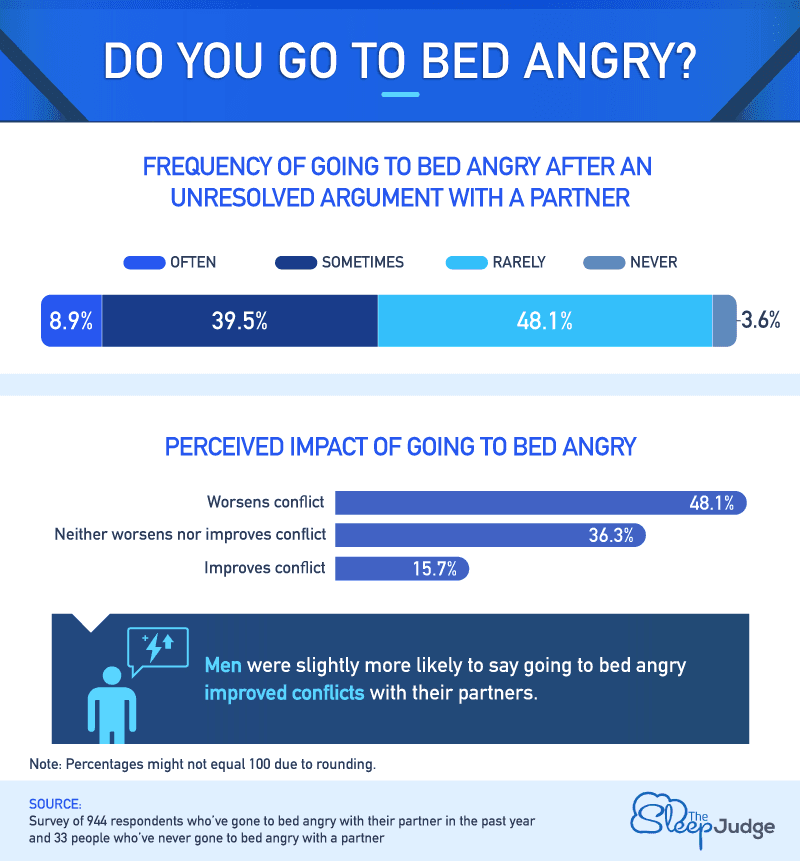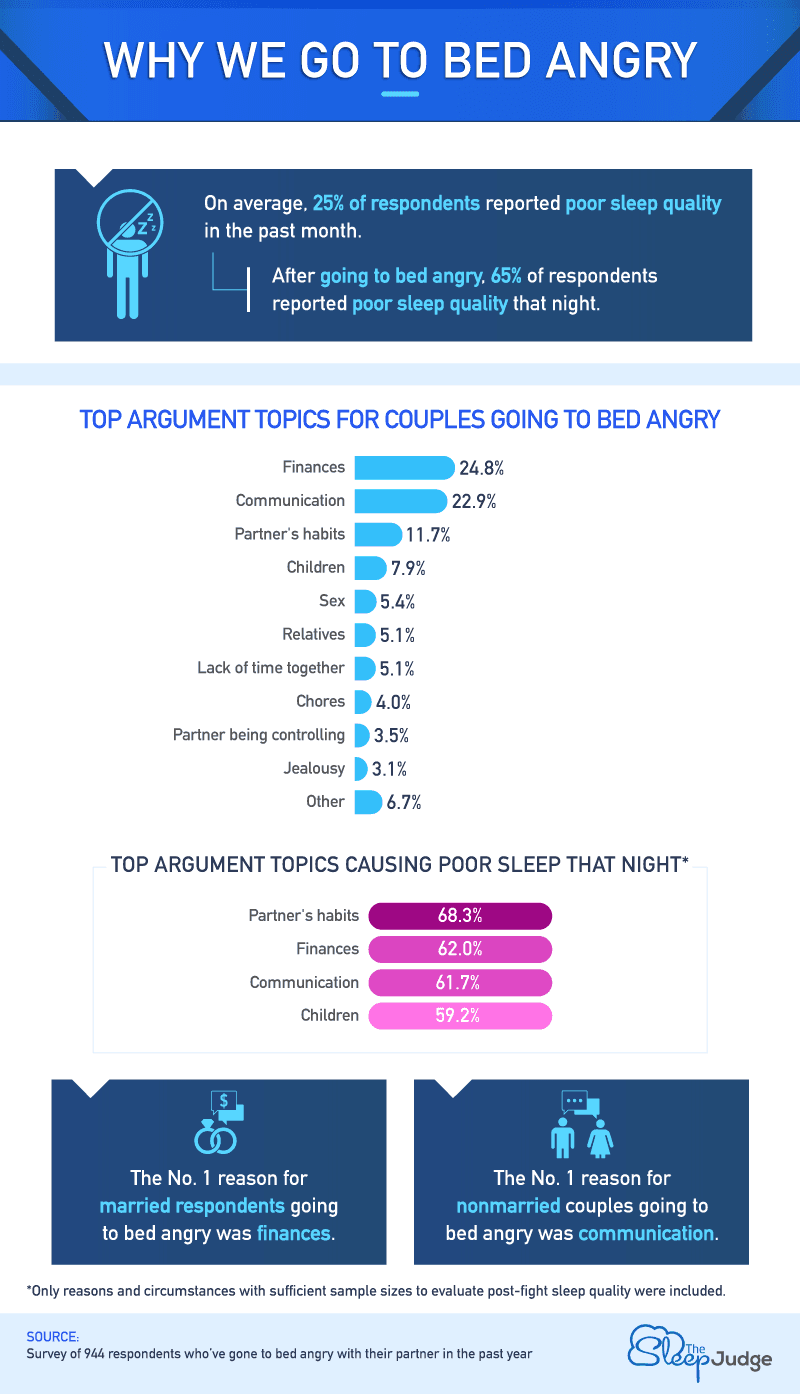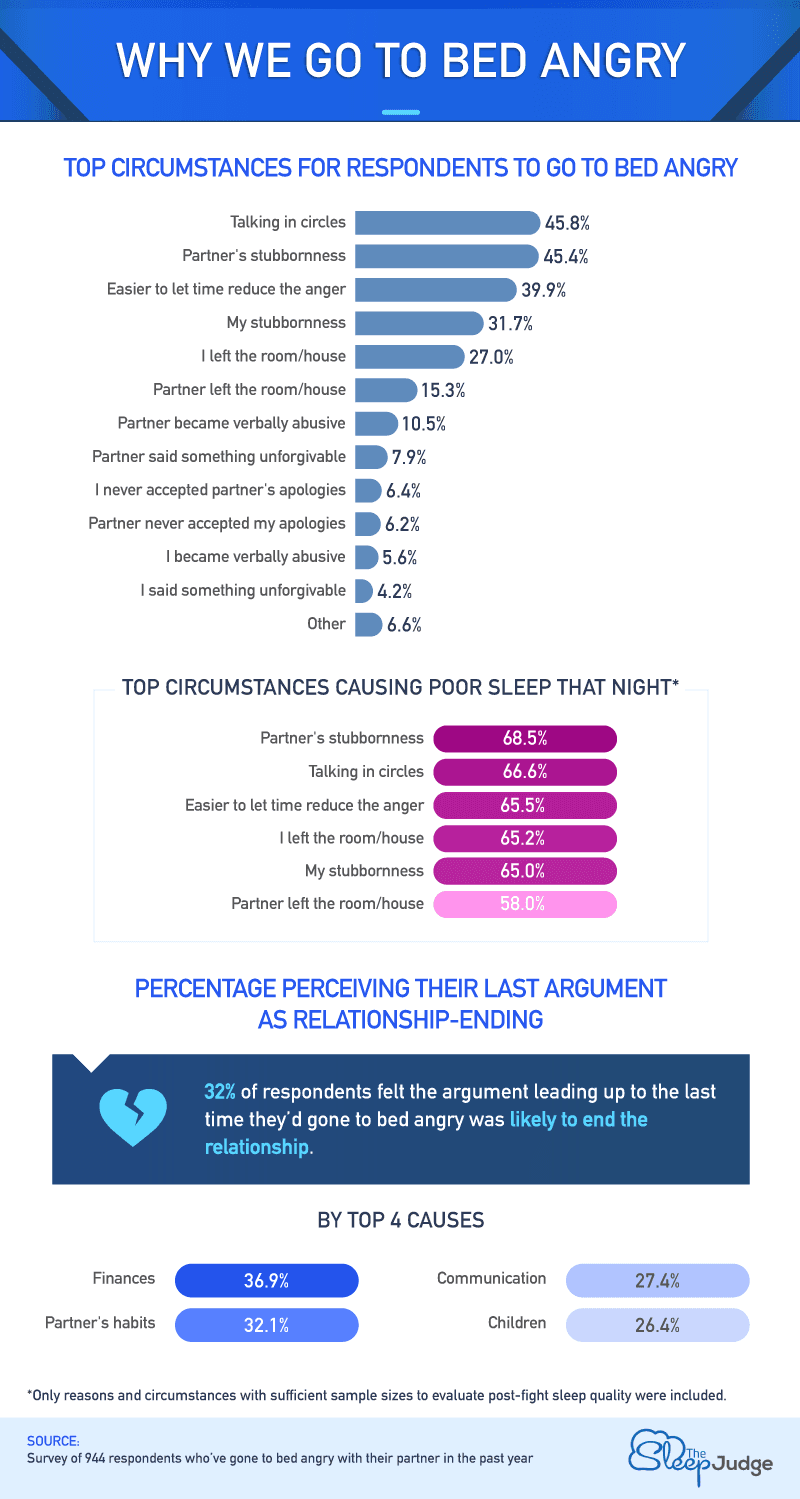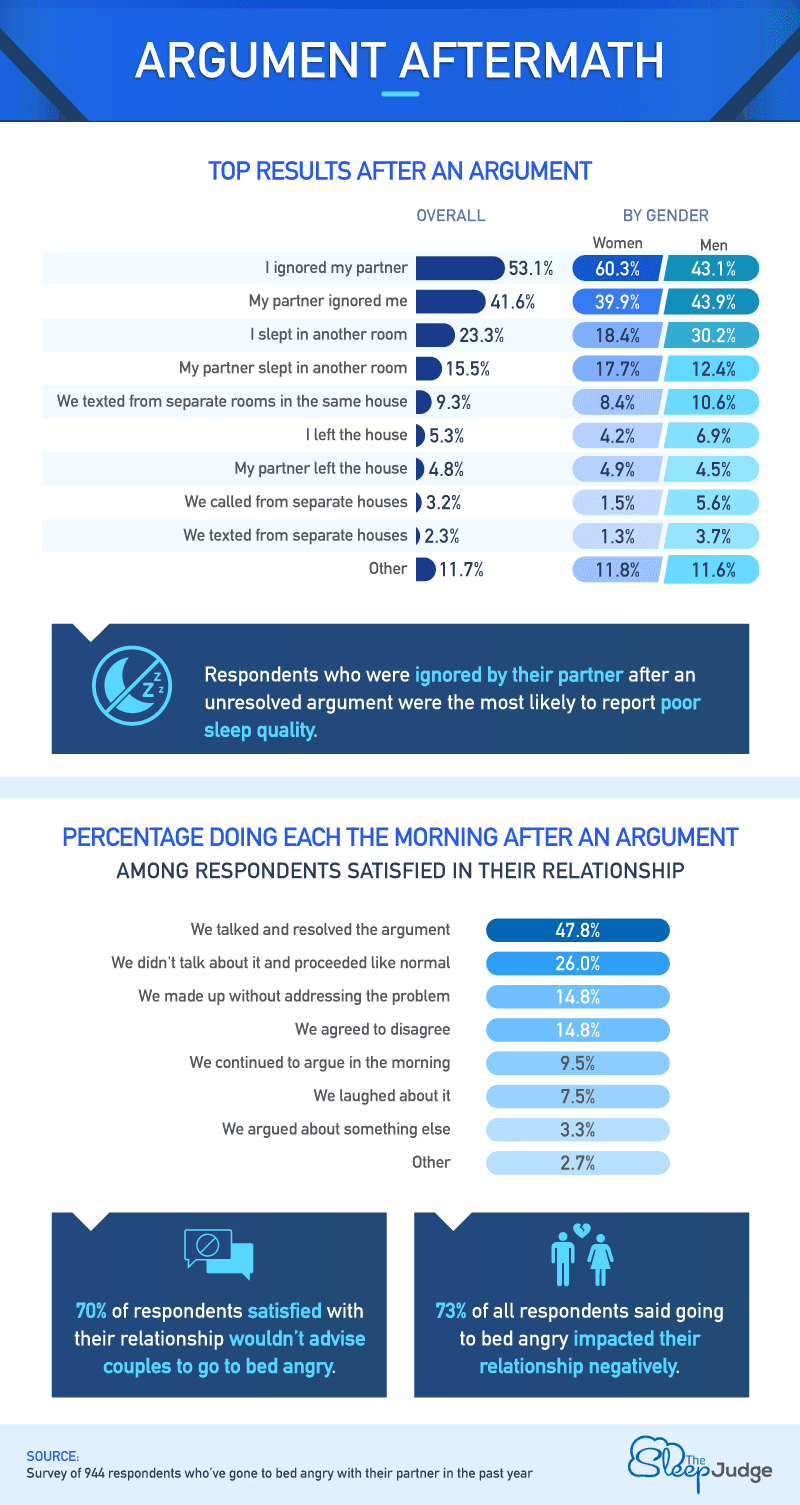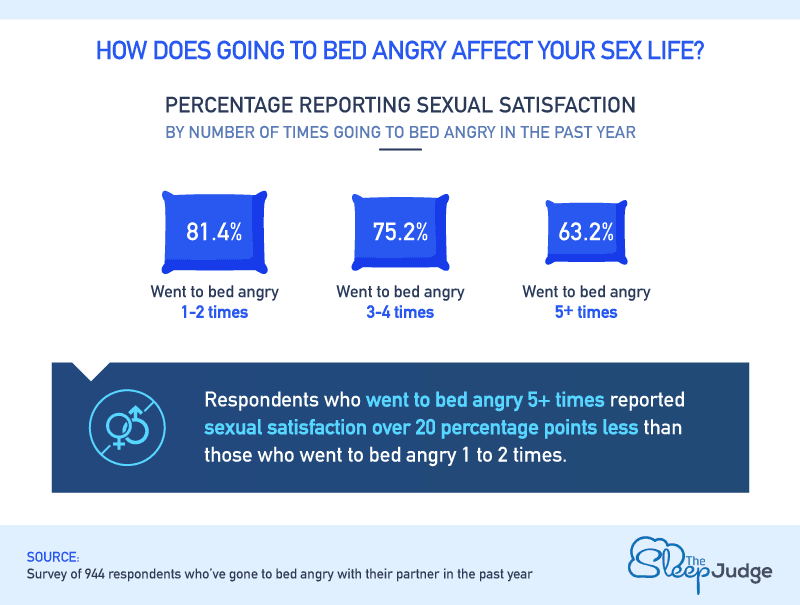padding-top:15px;
padding-bottom:7px;
}
The 1980s in America were a rough time for marriages – the overly talked-about statistic that half of all marriages end in divorce was actually true back then. Nearly 40 years later, millennials have caused the divorce rate to drop to about 39%. It’s not because they’ve found the secret to marriage, though. Instead, the younger generation is more selective about who they marry. But ask any long-term couple what the secret to marriage is, and their answer is likely to include some form of the old adage, “Don’t go to bed angry.”
This advice may work for many couples – resolving issues is always solid advice – but for some arguments, staying up to fight can actually worsen the problem. But what do couples have to say about it? We surveyed over 900 people who had gone to bed angry with their partner in the past year to learn how often it occurs, why it happens, and how it impacts couples. Read on to see if the adage still holds true.
Putting Arguments to Rest
Going to bed angry is not always a recipe for disaster. Exhaustion tends to amplify negative emotions, and staying up even later to come to a resolution may just exacerbate the problem. Luckily, it’s not an issue couples face too often. Only 9% of respondents said they went to bed angry often, while 48.1% reported it rarely occurs. It also seems to be more of an issue for younger couples – while those in relationships of 21 years or longer were the most likely to say they rarely went to bed angry, those in relationships of one to five years were the most likely to do so often.
Regardless of relationship length, the majority of people said going to bed angry worsened the conflict. Compared to just under 16% of people who said it improved the conflict, nearly half of respondents said it only made the problem worse. But sleeping in the midst of a disagreement affects more than just the argument – it also negatively impacts the quality of your sleep. One sleep study found that the angrier people rated themselves, the poorer their sleep was. And the less sleep people get, the quicker they can be to set off – which can quickly turn going to bed angry into a vicious cycle.
Pre-Sleep Spats
On average, 1 in 4 respondents reported poor sleep quality in the past month, yet when going to bed angry, 65% of respondents reported poor sleep quality that night. The topic of the disagreement also seemed to affect sleep quality, likely due to the severity of the fight. While finances and communication were the most common arguments that led to going to bed angry, arguments over partner’s habits were the most likely to lead to a poor night’s rest.
What You Say and How You Say It
Just like it’s not always about what you say, but how you say it, going to bed angry and poor sleep quality aren’t just related to the argument topic – it’s also about how it’s handled. Talking in circles and a stubborn partner were the most common circumstances for respondents to go to bed angry, with 45.8% and 45.4% reporting each, respectively. Though only 15.3% of people reported experiencing it, a partner leaving the room or house was the most likely situation to result in poor quality sleep. Of those whose partners have left in frustration, 68.5% reported sleeping poorly afterward.
While it’s important to consider how you go about arguing, certain topics are more likely to impact a relationship negatively. Thirty-two percent of respondents felt the argument leading up to the last time they’d gone to bed angry was likely to end their relationship, with the most common topic being finances. Considering finances are the third leading cause of divorce, couples should be extra cautious about how they approach the subject and may benefit from resolving the issue before going to sleep.
After the Fight
There’s not only a right way to handle an argument, there’s also a proper way to handle the aftermath. Cooling off, apologizing, and finding a solution to the problem is the best way to prevent it from happening again.
However, putting these steps into play in the heat of the moment can be difficult. After an argument, 53% of people said they ignored their partner, with women significantly more likely to do so. On the flip side, respondents who said their partner ignored them (41.6%) were also the most likely to report poor sleep quality after an unresolved argument.
Relationship satisfaction may also impact how people approach a conflict, especially the morning after – among respondents who reported being satisfied in their relationship, 47.8% said they talked and resolved the argument the next morning. Seventy percent also said they wouldn’t advise couples to go to bed angry, regardless of what outside research says.
Sexual Satisfaction
Going to bed angry clearly hurts relationship satisfaction, and when it comes to getting down and dirty in the bedroom, going to bed angry has just as much of an effect.
While 81.4% of respondents who reported going to bed angry one to two times in the past year reported sexual satisfaction, 63.2% of those going to bed angry five or more times in the past year reported the same. People who went to bed angry five or more times reported significantly lower sexual satisfaction than those who went to bed angry less frequently.
You may want to read: Best Mattress for Couples
Secret to Quality Sleep
While many studies have found instances where going to bed in the midst of an argument can prevent the problem from worsening, couples satisfied in their relationship stand by the sentiment: Don’t go to bed angry. The majority of people who had gone to sleep while angry reported negative consequences. From being ignored by partners and sleeping in different rooms to almost ending the relationship, going to bed angry didn’t seem to have many benefits.
And to make matters worse, angry sleep is not good sleep. Surrendering to the fight and sleeping on it results in poor sleep quality, which can not only exacerbate the issue but also lead to numerous other problems – both in health and happiness. While relationships may not be our area of expertise, quality sleep is. At The Sleep Judge, our experienced sleep experts analyze various sleep products to give you the best advice. Whether you need a new mattress, a new and improved pillow, or anti-snoring devices, our reviews ensure you’ll pick the best product to fit your needs. To learn more, visit us online today.
Methodology and Limitations
For this project, we surveyed 944 respondents in a relationship who had gone to bed angry after an argument with their partner in the past year. Respondents ranged in age from 30 to 73 with an average age of 44 and a standard deviation of 12.7. Fifty-eight percent of respondents identified as women, and 42% identified as men. 26% of respondents were in a relationship but unmarried; 74% were married. Eighty-four percent of respondents were satisfied in their relationship, 11% were dissatisfied, and 4% were neither satisfied nor dissatisfied. Forty-two percent of respondents had gone to bed angry one to two times in the past year, 30% did so three to four times, and 28% had done so five or more times after an unresolved conflict with their partner.
Limitations apply for survey-based data and include selective memory, telescoping, and exaggeration. We did not statistically test our data, and our campaign is purely exploratory.The data are not weighted. Responses rely on self-reporting by respondents.
Fair Use Statement
Do you want to share these findings on couples’ fights before bed? The graphics and information found on this website are available for use in any noncommercial capacity. Feel free to share them as much as you’d like across the web, on social media, and at the workplace, but please make sure to link back to this page. Thank you!

